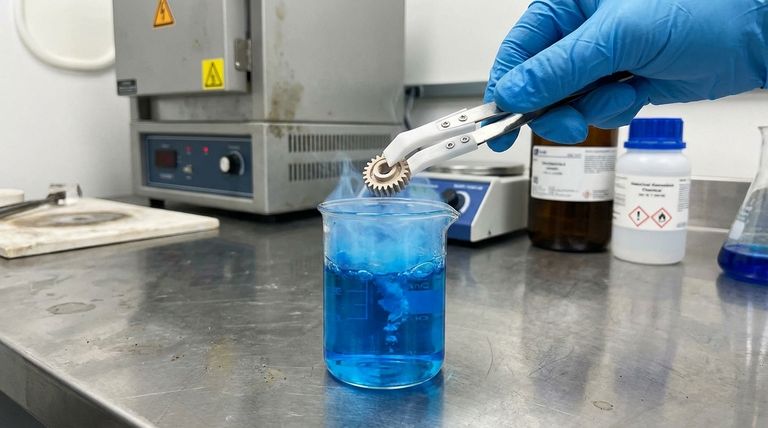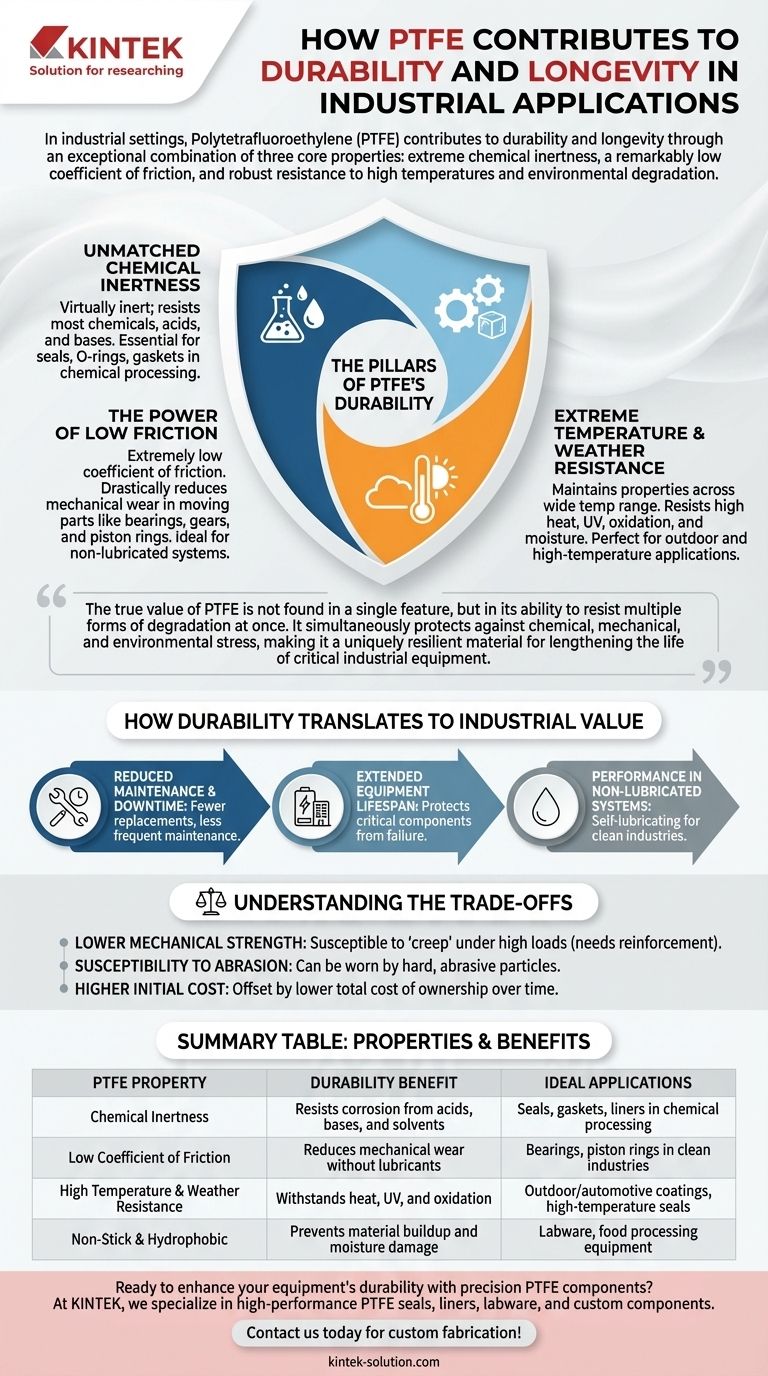In industrial settings, Polytetrafluoroethylene (PTFE) contributes to durability and longevity through an exceptional combination of three core properties: extreme chemical inertness, a remarkably low coefficient of friction, and robust resistance to high temperatures and environmental degradation. This unique trio of characteristics ensures components resist chemical attack, mechanical wear, and breakdown from heat or weather, leading to a significantly extended operational lifespan.
The true value of PTFE is not found in a single feature, but in its ability to resist multiple forms of degradation at once. It simultaneously protects against chemical, mechanical, and environmental stress, making it a uniquely resilient material for lengthening the life of critical industrial equipment.

The Pillars of PTFE's Durability
To understand PTFE's impact on longevity, we must look at the specific mechanisms that prevent failure and degradation over time.
Unmatched Chemical Inertness
PTFE is virtually inert and does not react with the vast majority of industrial chemicals, acids, and bases. This property is fundamental to its durability in harsh environments.
Where other materials would corrode or dissolve, PTFE maintains its structural integrity. This makes it essential for components like seals, O-rings, and gaskets in the chemical processing industry.
The Power of Low Friction
PTFE has one of the lowest coefficients of friction of any solid material, often compared to wet ice on wet ice. This inherent lubricity drastically reduces mechanical wear and tear.
In applications with moving parts like bearings, gears, and piston rings, this low-friction surface minimizes abrasion between components. This leads to longer-lasting parts, especially in systems where traditional oil or grease lubricants cannot be used due to contamination concerns (e.g., food, pharmaceutical, or textile industries).
Extreme Temperature and Weather Resistance
PTFE maintains its properties across a wide operating temperature range and has a very high melting point. It does not become brittle in cold temperatures or degrade in high heat.
Furthermore, PTFE coatings are highly resistant to UV radiation, oxidation, and moisture. This makes them exceptionally durable for outdoor applications in construction and automotive sectors, preventing embrittlement and extending the life of the underlying equipment.
Non-Stick and Hydrophobic Properties
The non-stick surface of PTFE prevents other materials from adhering to it, while its hydrophobic nature repels both water and oil.
This reduces material buildup that can cause friction or corrosion over time. It ensures smooth, consistent performance and reduces wear on mating surfaces, further contributing to the longevity of the component.
How Durability Translates to Industrial Value
The physical properties of PTFE create tangible economic and operational benefits in any industrial setting.
Reduced Maintenance and Downtime
Components that resist wear and degradation simply last longer. Using PTFE parts means fewer replacements, less frequent maintenance schedules, and a significant reduction in costly operational downtime.
Extended Equipment Lifespan
By protecting critical components from failure, PTFE extends the life of the entire piece of equipment. A durable seal or bearing can prevent a catastrophic failure in a much larger, more expensive system.
Performance in Non-Lubricated Systems
PTFE’s self-lubricating nature provides durability in environments where external lubricants would contaminate the product. It ensures long-term performance in clean industries that cannot tolerate oil or grease.
Understanding the Trade-offs
While exceptionally durable in many contexts, PTFE is not a universal solution. A technical advisor must acknowledge its limitations to ensure proper application.
Lower Mechanical Strength
Compared to metals or other engineered plastics, PTFE is a relatively soft material. Under very high mechanical loads, it can be susceptible to "creep" (slow deformation) and may not be the ideal choice without reinforcement from materials like glass or carbon fiber.
Susceptibility to Abrasion
While PTFE has an extremely low-friction surface, it can be worn away by hard, abrasive particles. In environments with significant abrasive contaminants, its lifespan may be reduced.
Higher Initial Cost
PTFE components can have a higher upfront cost than parts made from other polymers. The decision to use it often requires a total-cost-of-ownership analysis, where the higher initial price is offset by significantly lower maintenance and replacement costs over the equipment's life.
Making the Right Choice for Your Application
Selecting the right material depends entirely on the primary stress it will face in its environment.
- If your primary focus is resisting aggressive chemicals: PTFE's near-total chemical inertness makes it the default choice for seals, gaskets, and linings in chemical processing.
- If your primary focus is reducing mechanical wear without lubricants: PTFE's low-friction surface is ideal for bearings, slide plates, and piston rings in clean industries like food or pharmaceuticals.
- If your primary focus is outdoor or high-temperature endurance: PTFE coatings provide a durable barrier against UV, oxidation, and heat, extending the life of exposed components.
Ultimately, specifying PTFE is an investment in operational stability and long-term reliability.
Summary Table:
| PTFE Property | Durability Benefit | Ideal Applications |
|---|---|---|
| Chemical Inertness | Resists corrosion from acids, bases, and solvents | Seals, gaskets, liners in chemical processing |
| Low Coefficient of Friction | Reduces mechanical wear without lubricants | Bearings, piston rings in clean industries |
| High Temperature & Weather Resistance | Withstands heat, UV, and oxidation | Outdoor/automotive coatings, high-temperature seals |
| Non-Stick & Hydrophobic | Prevents material buildup and moisture damage | Labware, food processing equipment |
Ready to enhance your equipment's durability with precision PTFE components?
At KINTEK, we specialize in manufacturing high-performance PTFE seals, liners, labware, and custom components for the semiconductor, medical, laboratory, and industrial sectors. Our expertise ensures your critical equipment benefits from extended lifespan, reduced maintenance, and reliable performance—even in the most demanding environments.
Contact us today to discuss custom fabrication from prototypes to high-volume orders, and let our solutions protect your operations for the long term.
Visual Guide

Related Products
- Custom PTFE Parts Manufacturer for Teflon Parts and PTFE Tweezers
- Custom PTFE Parts Manufacturer for Teflon Containers and Components
- Customizable PTFE Rods for Advanced Industrial Applications
- Custom PTFE Volumetric Flasks for Advanced Scientific and Industrial Use
- Custom PTFE Square Trays for Industrial and Laboratory Use
People Also Ask
- What factors should be considered when choosing between Nylon and PTFE? Select the Right Material for Your Application
- What fabrication services are available for PTFE? Shearing, Stamping, Laser Cutting, Molding & Machining
- What are the unique properties of PTFE? The 3 Pillars Driving Demand for High-Performance Parts
- What industrial benefits do PTFE-machined parts offer? Achieve Peak Performance in Demanding Applications
- What are the main applications of PTFE type Teflon? Unlock Its Versatility for Your Industry



















